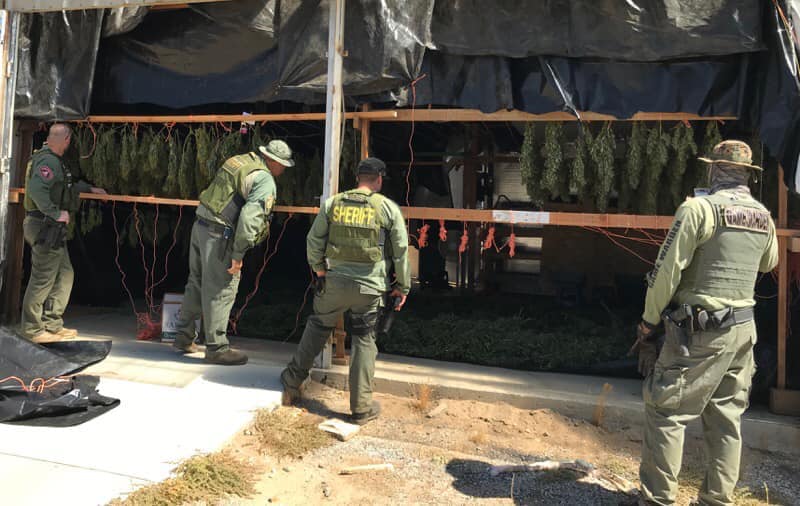As California cannabis businesses are being targeted for violent robberies across the state, the CA Bureau of Cannabis Control is asking for an 87-member police force to beef up its crackdown on unlicensed cannabis operations. It would create the law enforcement branch by hiring 29 more cannabis cops, and absorbing 58 positions from the Department of Consumer Affairs’ Cannabis Enforcement Unit, which has 47 police and 11 non-sworn personnel on staff.
According to The Sacramento Bee, the bureau seized nearly 24 tons of illicit cannabis in 2019, while the California Highway Patrol in 2018 seized more than 80 tons. California’s illicit market made an estimated $8.3 billion in sales in 2019, compared to the $3.1 billion the legal market, according to projections from BDS Analytics and Arcview Market Research.
Quoted in the SacBee story is George Tiongson of the California Association of Criminal Investigators, an affiliate of the union that represents the bureau’s employees who “are often behind enemy lines gathering necessary intelligence to thwart illegality” for crimes like human trafficking. CACI is part of the California Statewide Law Enforcement Association (CSLEA), which, along with various local and state agencies, has been involved in raids of several large marijuana grows across the state. CSLEA is part of PORAC, the Peace Officers Research Association of California, which represents over 930 associations, and is a heavy lobbying presence in the state.
The Governor deployed the National Guard against marijuana grows last year, and the Attorney General’s office reported that the Campaign Against Marijuana Planting (CAMP) eradicated 953,459 marijuana plants from 345 raided grow sites across the state in 2019, an increase from 2018’s reported take of some 600K plants, but not as many as 2017’s reported take of 1,260,000 plants, or 2016’s over 1.5 million claim. The DEA claims it eradicated over 3 million plants from California in 2019.
“We wish the state would do more to support legal cannabis operations, first by finding and arresting the criminal gangs that are robbing them, and next by reducing taxes and regulatory burdens and lowering barriers to licensing, rather than focusing on endless punitive measures that have never proved successful,” said Cal NORML deputy director Ellen Komp.
DEA Given More Powers Over Protesters
As first reported by Buzzfeed News, the federal Drug Enforcement Administration (DEA) is expanding its law enforcement powers so that it can better assist “to the maximum extent possible in the federal law enforcement response” to the wave of ongoing, nationwide protests currently taking place. Also called in were the National Guard, Customs and Border Protection, Immigration and Customs Enforcement and the Bureau of Prisons; active duty military were put on standby.
The DEA is not asserting its existing authority to arrest those participating in peaceful protests who may be in violation of federal drug laws. Rather, it is exerting newly expanded police powers to take action against those for whom it perceives to have engaged in the violation of any federal law.
“Given the DEA’s long track record as an overzealous, ideologically driven agency, this rapid expansion of its policing authority should be discomforting to us all,” wrote NORML Political Director Justin Strekal. “The DEA has long misused its drug enforcement powers, and especially its powers to enforce federal marijuana prohibition, to target dissident groups and populations of color.”
NORML wishes to remind those who are engaging in these peaceful protests that despite changes in the legal status of cannabis in the majority of US jurisdictions, marijuana possession and use remains a violation of federal law. Because we know that the DEA is playing a more prominent role in surveilling these activities and taking law enforcement actions, NORML reminds anyone participating in these events to refrain from the possession or use of cannabis while doing so.
Congressional Judiciary Committee Chairman Jerrold Nadler (D-NY) and Rep. Karen Bass (D-CA), among others, sent a letter to Attorney General William Barr telling him that the temporary expansion of DEA power is unwarranted and their “narcotics interdiction tactics” are inappropriate to deal with protestors.
Meanwhile, the district attorneys of San Francisco, Contra Costa and San Joaquin counties, along with former SF DA George Gascon (a candidate for LA DA), have sent a letter to the State Bar Assn. asking them to prohibit District Attorneys from accepting donations from police unions, citing the possible conflict of interest this poses “in the wake of mass protests following the killing of George Floyd by Minneapolis police officers.” And Los Angeles is looking at cutting $150M from its police budget to invest in communities “left behind.”
Racism Persists in the War on Marijuana
A recent report from the ACLU shows that racial disparities in marijuana possession arrests continue in California and across the nation. Another recent study found people of color are still disproportionately targeted for traffic stops.
California Senator Kamala Harris noted at a Judiciary Committee hearing on Prison Safety and the Coronavirus this week that 70% of those in US prisons are black and brown people, and while Paul Manafort and Michael Cohen qualified for home detention due to COVID concerns, 62-year-old Fidel Torres died of COVID-19 in a federal prison while serving the final two years of his 20-year sentence for a marijuana offense.

